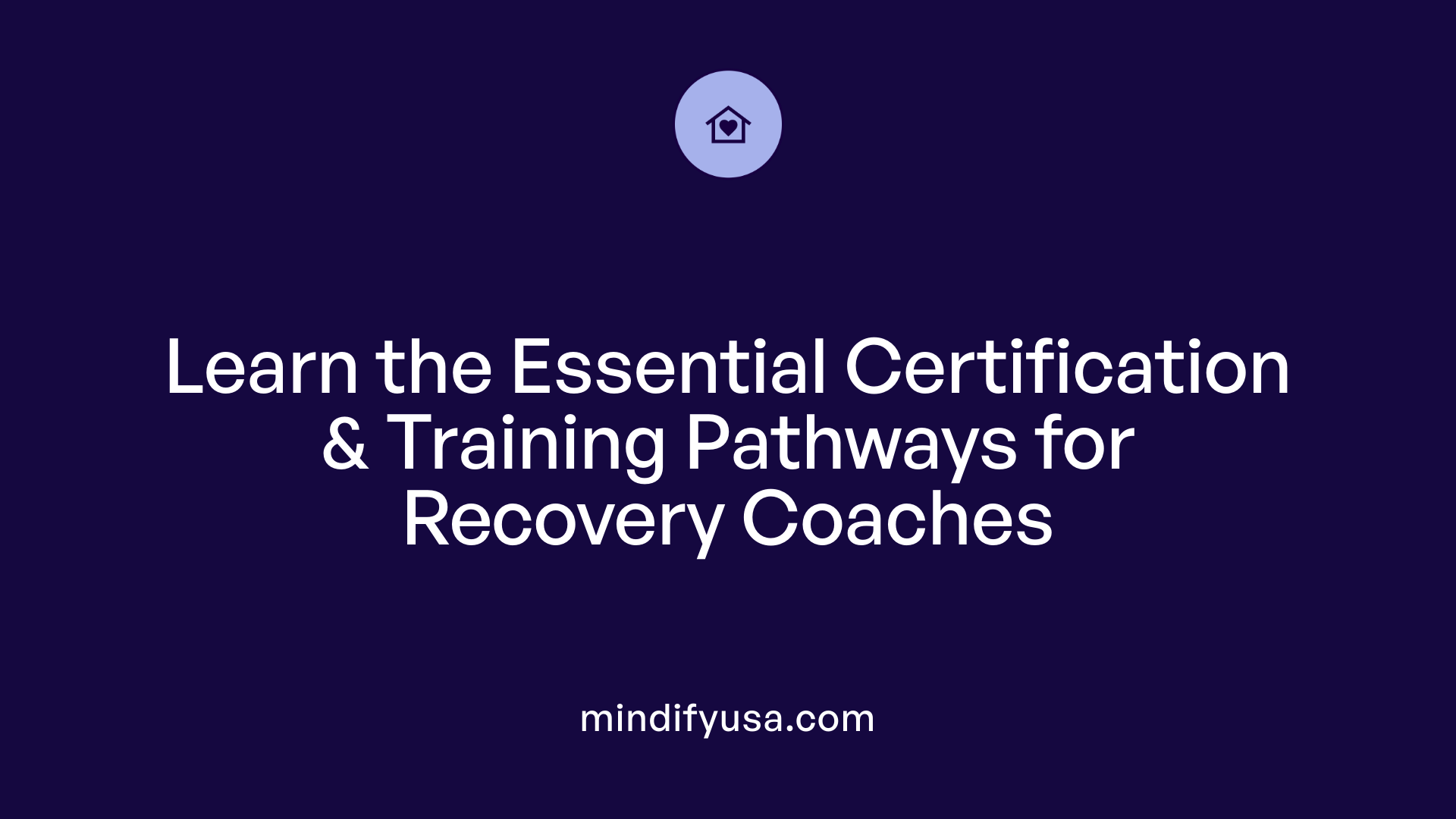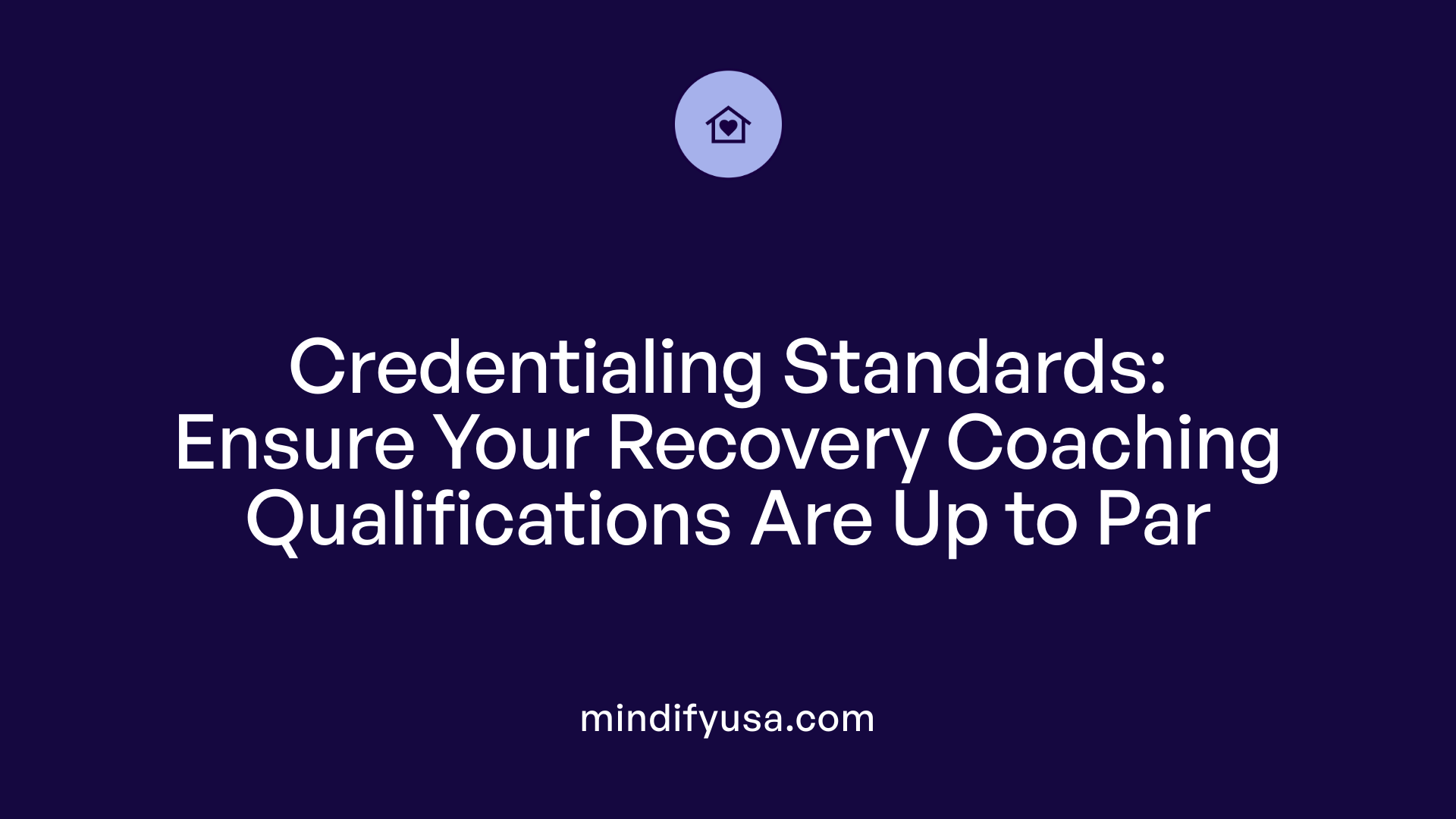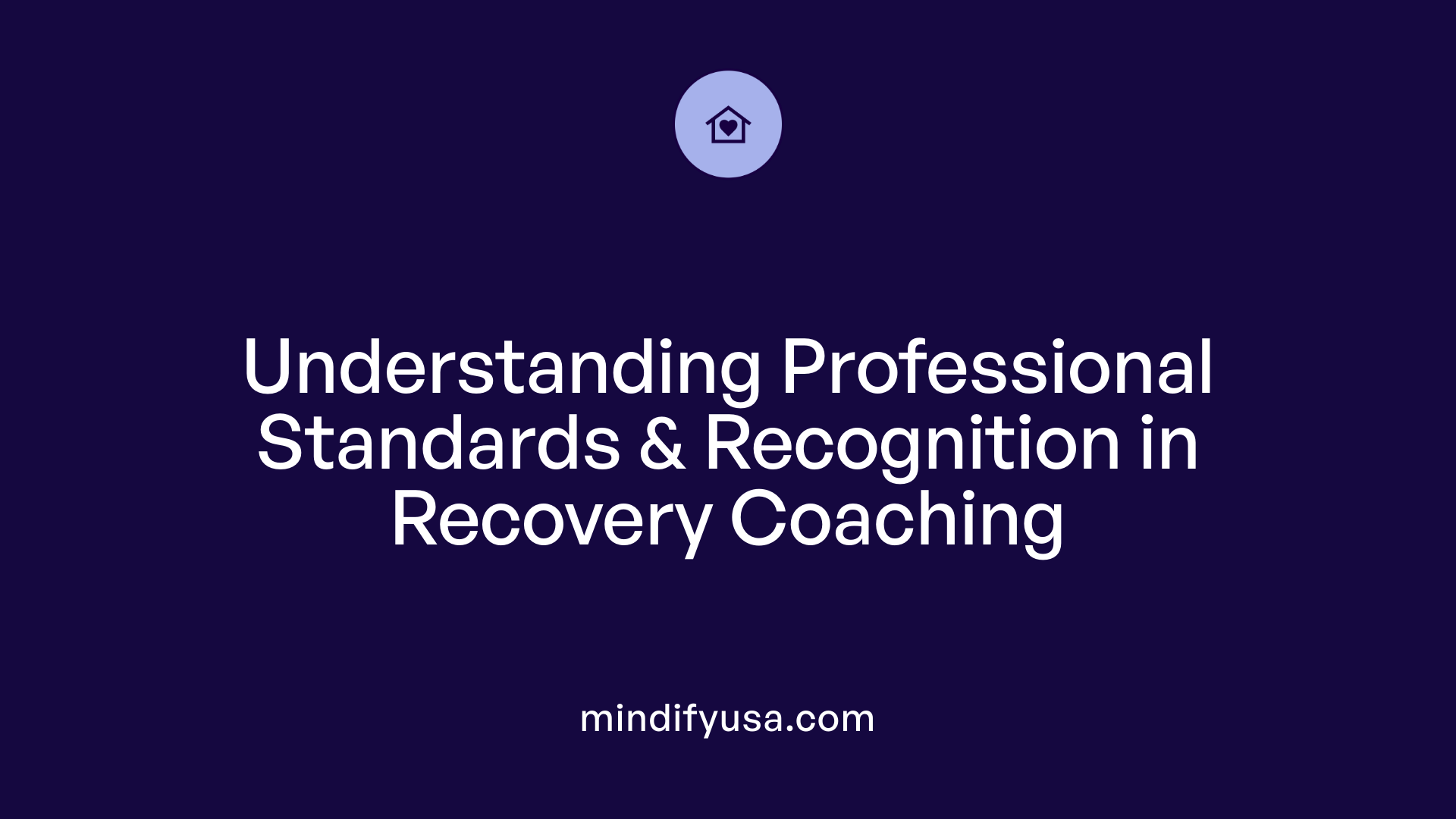Introduction to Recovery Coaching Credentials
Recovery coaching is an evolving field within addiction support services, emphasizing professional qualifications, ethical practice, and consistent standards. A key question many ask is whether recovery coaches hold formal credentials. This article explores the various certifications available, the standards governing recovery coaching, and how these credentials differentiate recovery coaches from other support roles.
Certification and Training Requirements for Recovery Coaches

What are the certification and training requirements for recovery coaches?
Becoming a recovery coach involves a combination of education, training, and practical experience. Typically, candidates must hold at least a high school diploma or an equivalent such as a GED. They are required to complete around 100 hours of specialized, state-approved training covering essential topics like coping skills, ethics in recovery coaching, relapse prevention, and community resource navigation.
In addition to formal training, prospective recovery coaches need to document at least 500 hours of professional recovery support work or volunteer experience. This experience can be gained through various settings, including clinics, community centers, or non-profit organizations.
Supervised practical experience is also crucial. Candidates must complete a minimum of 25 hours of supervised work, which allows them to apply their knowledge in real-world situations under guidance.
Certification requirements are often dictated by the certifying body or state regulations. Common certifications involve passing a comprehensive examination, like the IC&RC Peer Recovery exam, which tests knowledge of recovery principles, ethics, and best practices.
Specific training programs such as the CCAR Recovery Coach Academy and programs at North Shore Community College are nationally recognized and prepare candidates for certification. These programs offer extensive courses designed to meet or exceed certification standards, and graduates can apply for credentials such as the Recovery Coach Professional (RCP).
Certification is usually valid for a set period—often three years—and requires ongoing education for renewal. Recertification involves completing continuing education units (CEUs), reaffirming adherence to ethical standards, and paying renewal fees.
The process ensures that recovery coaches maintain verified skills and uphold professional ethical standards, supporting their ability to assist individuals effectively in their recovery journeys.
| Certification Type | Requirements | Recognized By | Renewal Period | Additional Notes |
|---|---|---|---|---|
| CCRC (Certified Recovery Coach) | Complete CPRC training, demonstrate core competencies, pass review process | International Association of Professional Recovery Coaches | Every 3 years | Includes review of a coaching session, transcript, feedback |
| CRPA (Certified Recovery Peer Advocate) | 50 hours training, 500 hours support work, supervision, exam | New York Certification Board | Every 3 years | Certification for peer support roles |
| CARC (Certified Addiction Recovery Coach) | Accredited training, practical experience, exam | National/International Bodies | Every 3 years | Suitable for private practice, voluntary roles |
This structured pathway ensures recovery coaches are well-prepared, ethically grounded, and capable of providing tailored support to those working through recovery.
Credentialing and Qualification Standards in Recovery Coaching

What are the credentialing and qualification standards within the recovery coaching profession?
Recovery coaching credentialing standards are established to ensure that professionals possess the necessary skills, knowledge, and ethical standards for effective client support. These standards usually involve completing specific recognized training programs, demonstrating core competencies, and fulfilling experience requirements.
Reliable certification bodies such as the International Association of Professional Recovery Coaches (IAPRC), IC&RC, and the New York Certification Board set comprehensive guidelines. They often require candidates to complete approved coursework—like the CCAR Recovery Coach Academy or equivalent programs—and accrue practical experience, which can include volunteer or paid support roles.
Most certifications emphasize the importance of personal recovery experience, with many requiring a minimum of two years of lived recovery. This personal insight enhances credibility and empathetic understanding. Furthermore, candidates typically undergo a certification exam and submit a coaching session video for review, ensuring they meet competency standards.
Core aspects of credentialing include adherence to ethical standards, development of cross-cultural competence, and application of recovery principles. For instance, recovery coaches should utilize trauma-informed, person-centered approaches that respect individual diversity.
Standards are generally designed to maintain professional integrity and quality, but they can vary across states and organizations. Consequently, continuous professional development and regular re-certification are often mandated, involving ongoing education and retraining.
In summary, the credentialing landscape in recovery coaching emphasizes validation of skills, adherence to ethical guidelines, and commitment to professional growth, with specific requirements shaped by the certifying organization and regional regulations.
| Certification Body | Required Training | Experience Hours | Certification Validity | Special Notes |
|---|---|---|---|---|
| IAPRC | Specific recovery coaching course | 500 hours of professional support | Usually 3 years | Includes ethics and legal considerations |
| IC&RC | Recovery Support Fundamentals, ethics courses | Personal and professional experience | 3-year renewal | Certification exams and session reviews |
| NY Certification Board | 50-hour training, supervised practice | Volunteer or work experience | 3 years | Required for NYS licensed centers |
| ICAADA (CRPA) | 50-hour core training, ethics, supervision | 500 hours support | 3 years | Includes personal recovery experience |
These standards collectively ensure that recovery coaches are qualified, competent, and prepared to provide high-quality support, fostering trust and efficacy in recovery pathways.
The Certification Process for Recovery Coaches

How does the certification process for recovery coaches work?
Becoming a certified recovery coach involves a structured process designed to verify their skills, knowledge, and ethical standards. Typically, candidates must complete a combination of education, practical experience, and a formal examination.
First, aspiring recovery coaches often start with specialized training programs. For instance, accredited courses like the CCAR Recovery Coach Academy or online programs approved by organizations such as NAADAC provide foundational knowledge in recovery support, ethics, and legal considerations. These courses usually range from a few days to several weeks, covering essential competencies.
Once training is completed, candidates need to demonstrate experience. For example, in some states like California, candidates are required to document at least 500 hours of volunteer or paid experience in recovery support roles. This experiential component ensures that coaches have practical exposure and understanding of client needs.
The next step involves passing a comprehensive certification exam administered by professional organizations like the International Certification & Reciprocity Consortium (IC&RC). These exams assess knowledge of recovery principles, ethical standards, and core competencies essential for effective coaching. For example, the IC&RC Peer recovery exam evaluates a candidate’s ability to apply evidence-based strategies and maintain professional integrity.
Additional prerequisites often include references from supervisors or colleagues, and in some cases, a personal lived experience with recovery can be advantageous. After passing the exam and fulfilling experience requirements, candidates receive a certification like the CRPA (Certified Recovery Peer Advocate) or CARC (Certified Addiction Recovery Coach). These credentials validate their professional capacity.
The certification process does not end there. To maintain their credentials, recovery coaches must engage in ongoing education. Most certifications require renewal every two to three years, with professionals needing to complete continuing education units (CEUs). Renewal procedures typically involve submitting proof of completed training hours, paying renewal fees, and possibly participating in supervision or mentorship activities.
In summary, the pathway to becoming a certified recovery coach involves a blend of education, experience, and formal assessment, all overseen by reputable organizations dedicated to maintaining standards within the field.
Recognition and Professional Standards in Recovery Coaching

Are there recognized professional standards or recognition for recovery coaches?
Yes, recovery coaching is backed by established professional standards and certification processes. Multiple organizations play a crucial role in setting these benchmarks to ensure coaches possess the necessary skills, ethics, and competencies.
The International Certification & Reciprocity Consortium (IC&RC), the Center for Motivation and Change (CCAR), and the International Association of Addiction and Recovery Coaches (ICAADA) are among the primary organizations involved in credentialing recovery professionals.
The IC&RC offers certification exams, such as the International Recovery Coach Certification (IC-RC), which validate a coach's knowledge, skills, and adherence to ethical standards. CCAR provides a rigorous Recovery Coach Academy that is recognized nationally and internationally, focusing on core skills, ethical conduct, and legal considerations.
ICAADA offers multiple credential pathways, including the Certified Peer Recovery Advocate (CRPA), Certified Addiction Recovery Coach (CARC), and other specialized endorsements. These certifications require completion of specific training courses, experience hours, and passing a comprehensive exam.
Core competencies and ethical standards
Certification programs emphasize core skills such as relationship-building, trauma-informed care, and cultural competence. Ethical guidelines are integral, covering client confidentiality, professional boundaries, and culturally sensitive practice.
Recovery coaches are expected to uphold high standards of integrity, continuous education, and self-awareness. Most certification bodies require ongoing education and renewal every few years to maintain credentials.
Impact of certifications on professional recognition and credibility
Achieving certification from recognized organizations enhances a recovery coach’s credibility. It demonstrates verified skills, ethical adherence, and a commitment to professional development.
This recognition helps coaches market themselves effectively, especially in competitive environments like clinical settings, community programs, and private practice. Certifications also foster public trust, as clients can better identify qualified professionals.
Standards for ongoing education and ethical practice
Continuing education (CEUs) are mandated by most certifiers, covering topics like new treatment approaches, ethical updates, and cultural competence.
Supervision and peer consultation are encouraged to maintain high standards. Certifications like CRPA and CARC are valid for three years, requiring renewal through education credits or re-examination.
All certified professionals must adhere to the ethical codes set by their certifying bodies. These include maintaining confidentiality, avoiding conflicts of interest, and practicing within the scope of their training.
| Organization | Certification Type | Core Focus | Renewal Requirements |
|---|---|---|---|
| IC&RC | IC-RC | Competency, ethics, legal standards | Re-certify every 3 years, CEUs required |
| CCAR | Recovery Coach Academy Certification | Practical skills, ethics, trauma-informed care | Continuing education, renewal every 3 years |
| ICAADA | CRPA, CARC | Personal experience, ethics, legal standards | Renewal every 3 years with CEUs |
Search for more information
For professionals seeking further details, search queries like "Professional standards recovery coaching recognition certification" provide valuable resources to stay updated on credentialing requirements, ethical guidelines, and best practices.
How Recovery Coaches Differ From Support Roles Like Sponsors
How do recovery coaches differ from other support roles like sponsors?
Recovery coaches and sponsors serve related but distinct roles within the recovery landscape. Understanding their differences in training, scope, and approach helps clarify the unique services each provides.
Recovery coaches are trained or certified professionals who support individuals through comprehensive, goal-oriented recovery plans. They employ evidence-based strategies and take a holistic view, addressing areas such as mental health, employment, housing, and social relationships. Their approach is structured and professional, often working with clients over an extended period to promote sustainable recovery.
In contrast, sponsors are usually peers with personal recovery experience who volunteer within 12-step programs like Alcoholics Anonymous (AA) or Narcotics Anonymous (NA). Sponsors offer informal mentorship primarily focused on spiritual growth and guiding newcomers through the 12 steps. Their support is more spiritual and community-oriented, emphasizing ongoing participation in the specific program.
The scope of these roles also differs. Recovery coaches adopt a broad perspective, assisting clients in multiple facets of life to support their recovery journey. They employ evidence-based methods and maintain professional boundaries, often working in clinical, community, or private practice settings. Conversely, sponsors provide emotional and spiritual support rooted in the principles of the 12-step model, typically on a volunteer basis.
Duration and nature of support relationships vary as well. Recovery coaching relationships tend to be formal, goal-directed, and can last for months or even years, depending on client needs. Clients benefit from structured sessions, tailored strategies, and accountability measures.
Sponsors usually engage in shorter, more informal relationships. Their guidance is based on personal experience, with the relationship often centered around spiritual and motivational support within the context of a recovery program.
| Aspect | Recovery Coaches | Sponsors |
|---|---|---|
| Training and Certification | Formal, specialized training, certifications | Volunteer, personal recovery experience |
| Scope of Support | Holistic, including life skills and resource navigation | Spiritual and community-based support |
| Approach | Evidence-based, structured, goal-oriented | Spiritual, mentoring, informal |
| Relationship Duration | Usually long-term, goal-focused | Often short-term, relationship-based |
| Typical Settings | Clinical, community, private practice | 12-step meetings, peer groups |
In summary, while both recovery coaches and sponsors contribute significantly to an individual's recovery, they serve distinct functions. Recovery coaches provide structured, professional support across various life domains, facilitating holistic growth. Sponsors offer informal, spiritual mentorship within 12-step programs, emphasizing community and faith-based recovery. Recognizing these differences can help individuals choose the support that best fits their recovery needs.
Final Thoughts: Ensuring Quality in Recovery Support
While the field of recovery coaching increasingly emphasizes credentialing and professional standards, it remains a diverse profession with varying regional and organizational requirements. Holding recognized certifications from reputable organizations like IC&RC, CCAR, or ICAADA demonstrates a commitment to competency, ethics, and ongoing professional development. Certification not only enhances a recovery coach’s credibility but also ensures that clients receive ethically sound, effective support tailored to their needs. As the sector continues to evolve, adherence to recognized standards will be essential for maintaining trust, quality, and credibility in recovery support services.
References
- Certified Corporate Recovery Coach (CCRC)
- Recovery Coach Requirements
- Frequently Asked Questions (FAQs)
- Recovery Coach Career Pathways
- Is a Sponsor and a Recovery Coach the Same Thing?
- Professional Recovery Coach
- Become a Certified Recovery Peer Advocate
- Certification
- Peer Recovery Coaching Standards for Professional Practice
- Peer Recovery (PR) - IC&RC





































































































